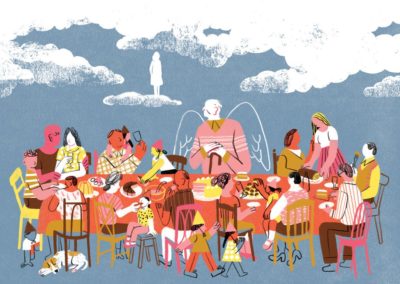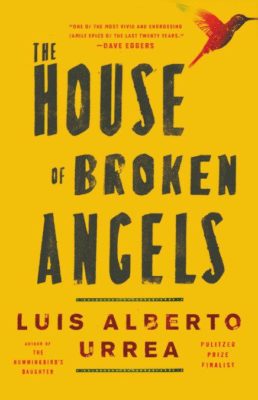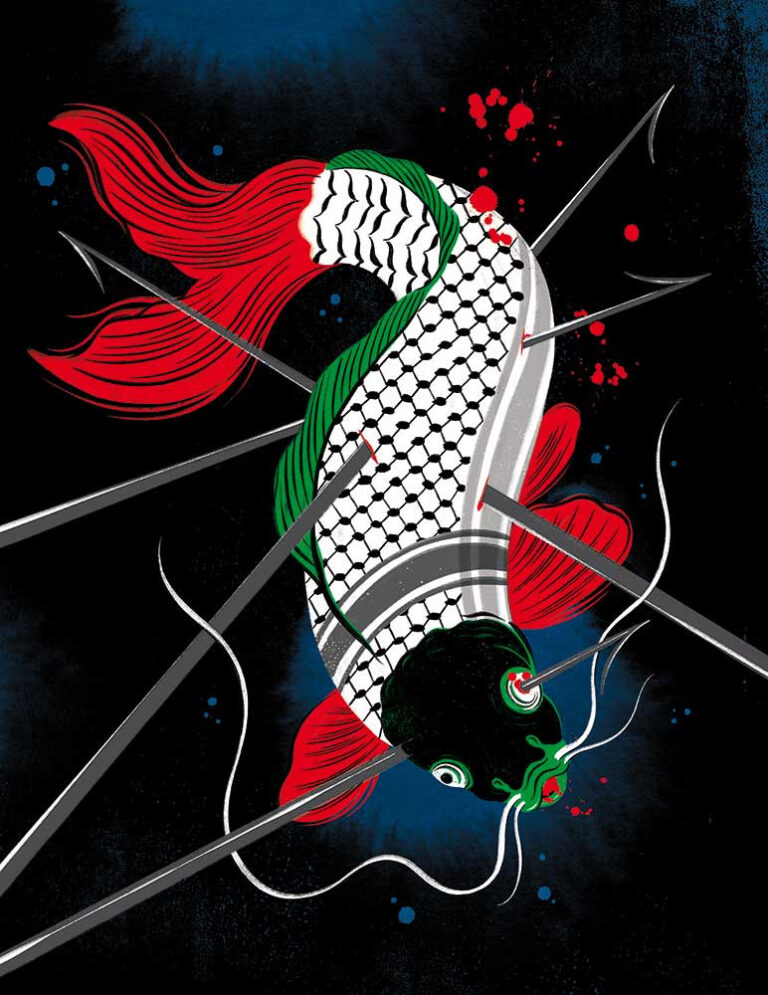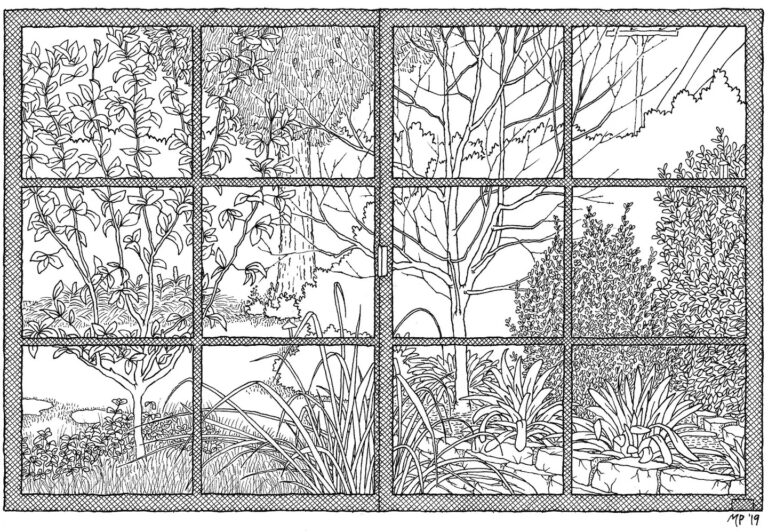Viet Thanh Nguyen reviews Luis Alberto Urrea’s The House of Broken Angels for The New York Times.

Luis Alberto Urrea’s sorrowful and funny new novel, “The House of Broken Angels,” is one of those epic books about a complicated family that typically begin with a family tree to help the reader make sense of the relationships. Fortunately, this novel does not have such a tree. Instead, the reader has to do what any guest visiting such a family for the first time must do: Be alert, be attentive, be appreciative. And there is much to appreciate in Urrea’s highly entertaining story of Big Angel, the de La Cruz family’s patriarch, who buries his mother even as he himself is dying and as his family gathers to celebrate his 70th, and last, birthday.
Dispelling the notion held by some Americans that all Mexicans have just crossed the border, Urrea creates a rambunctious de La Cruz family that lives in San Diego and “has been around here since before your grandparents were even born.” Urrea is intent on both celebrating the particularities of Mexican-American life and attacking the anti-Mexican racism that has been a part of American culture ever since the United States conquered quite a bit of Mexico. Well aware that Mexicans are perceived by many, including themselves, as having a flexible relationship with time — “You know you’re a Mexican when lunch doesn’t show up till 10 at night” — Big Angel prides himself on his punctuality. “As if a Mexican couldn’t be punctual,” he says. “As if Vicente Fox was late to things, cabrones.”

The quips and jokes come fast through a poignant novel that is very much about time itself, especially the passing of time and the inevitability of death. The narrative unfolds in a little over a week, from the funeral of Mamá América to the passing of Big Angel. The last is hardly a secret, given how his name signals toward heaven. In addition, we know from early in the novel that he is dying of cancer and that his body’s basic functions are nearly beyond him. His wife, Perla, and daughter, Minnie, must help him bathe and relieve himself. “I used to be your father,” Big Angel says to Minnie with a sob. “Now I am your baby.” From the threshold of death back to the beginning of life, Big Angel finds himself in a “time bubble” and a “time storm,” immersed in memories of his journey from Mexico to the United States and the complexities of his family drama.
Technically, Big Angel and Perla are undocumented immigrants, having crossed the border from south to north as teenagers. But Urrea takes care to show how Mexicans and Mexican-Americans — and Americans as a whole — are caught in the ever-changing politics and economics of border definitions and labor exploitation. Big Angel’s “grandfather Don Segundo had come to California after the Mexican Revolution, crossing the border in Sonora.” In the United States, he “learned English and learned to love baseball” during a time when Mexican labor was needed. When that time ended, however, “the de La Cruz family became Mexican again when they went back south in the great wave of deportations of 1932, joining two million mestizos rounded up and sent across the line in boxcars. The United States had apparently grown weary of hunting down and deporting Chinese people for the moment.”
Border politics have been important to Urrea — a prolific author of fiction, poetry and nonfiction — since he began his career with 1993’s “Across the Wire: Life and Hard Times on the Mexican Border.” During the 10-year struggle to publish his first book, he was told by one New York editor that “nobody cares about starving Mexicans.” Big Angel, his mother and his siblings are among those starving Mexicans who ultimately ascend to the middle and working classes. Big Angel is able to rent and then buy his home in a neighborhood where “all the houses had bars on the windows, which scared outsiders but which nobody from there even saw.” Big Angel’s achievement of the (Mexican) American dream is made possible by working multiple jobs — contrary to the stereotype of lazy Mexicans that irritates him so much — until he finally lands a position running computers for the gas and electric company, even though “he didn’t even like computers. A Mexican doing what these rich Americanos couldn’t do was the point.”

For all of his success, however, he cannot protect his family from the things that life might tempt them with. Personal tensions, carnal desires and extramarital affairs inflame his siblings, in-laws, children and grandchildren. One of his stepsons with Perla, Yndio, is a “non-cisgendered, non-heteronormative cultural liberation warrior.” Another stepson, Braulio, was killed in a gang shooting. His own son, Lalo — traumatized by a tour in Iraq — struggles with drug addiction and his undocumented status, a situation unresolved by his military service. After being deported, Lalo had to cross back into the United States. A nephew, Marco, is the lead singer in a heavy metal band and stylizes himself as “the Satanic Hispanic.” He falls in love with a Dreamer, a young woman brought to the United States as an undocumented infant.
Many of the cheerfully profane activities of the family are seen through the eyes of Little Angel, Big Angel’s half brother, born of the union between Big Angel’s father and the white American woman for whom he left Mamá América and his family. Little Angel is a professor of literature, “the American,” “the Assimilator,” who struggles with his ambiguous place in the wholeheartedly Mexican-American de La Cruz family. His loving and tormented relationship with Big Angel, the older brother who broke his nose in a fistfight but who wants him to crawl into his deathbed, is one of the many touching relationships rendered with grace and empathy by Urrea.
Anger and sorrow are one pair of emotions that keeps surfacing throughout “The House of Broken Angels.” So do love and pain, joy and resentment, hatred and reconciliation, backstabbing and tenderness. All complicated, all compelling in Urrea’s powerful rendering of a Mexican-American family that is also an American family. And what is Urrea’s novel but a Mexican-American novel that is also an American novel? American in the broadest possible sense, from the United States of America, north of the border, to Mexico and by implication all of the other countries south of the border that are also American. The novel disrespects borders, and that, no doubt, will infuriate those readers who couldn’t care less about Mexicans, starving or otherwise, if their legal status is in doubt.
Urrea rightfully does not care about legal status, given the doubtful legality and certain unjustness of many American policies aimed at Mexico, Mexican migrants and Mexican-Americans. He is more concerned with expressing Little Angel’s belief, as he observes the intricacies of his family, that “if only the dominant culture could see these small moments, they would see their own human lives reflected in the other.” And the other that ultimately matters in this novel is death. Facing that last border that we all share and must cross, we can only hope to be like Big Angel, who “invited every memory to come to him and clothe him in beauty.”


